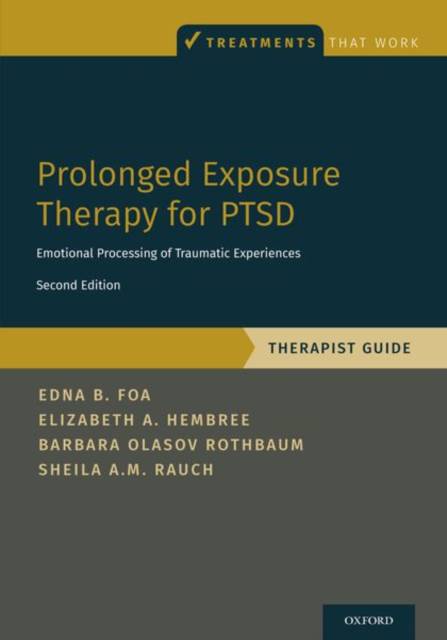
- Afhalen na 1 uur in een winkel met voorraad
- Gratis thuislevering in België vanaf € 30
- Ruim aanbod met 7 miljoen producten
- Afhalen na 1 uur in een winkel met voorraad
- Gratis thuislevering in België vanaf € 30
- Ruim aanbod met 7 miljoen producten
Zoeken
Prolonged Exposure Therapy for Ptsd
Emotional Processing of Traumatic Experiences - Therapist Guide
Edna Foa, Elizabeth A Hembree, Barbara Olasov Rothbaum, Sheila Rauch
€ 114,45
+ 228 punten
Uitvoering
Omschrijving
Prolonged Exposure Therapy is an effective, highly flexible, and very well researched intervention to reduce the symptoms of PTSD across a variety of traumatized populations. The second edition of Prolonged Exposure Therapy for PTSD: Emotional Processing of Traumatic Experiences, Therapist Guide, along with the accompanying Workbook, provides all of the tools necessary for trained mental health providers to implement this first-line PTSD treatment with their patients. This model is individualized to address the needs of a variety of trauma survivors. Leaders in clinical practice, training, and research in the field of PTSD treatment, the authors have revised the Guide throughout to reflect the many advances in PTSD research that have occurred since the release of the first edition, including key adjustments to the underlying theory as well as additional evidence for modifications and individualization for more complex patient presentations and military populations. The Guide provides a concise but thorough description of the key components of the program, how to implement them, and when and how to consider adaptations.
Specificaties
Betrokkenen
- Auteur(s):
- Uitgeverij:
Inhoud
- Aantal bladzijden:
- 200
- Taal:
- Engels
- Reeks:
Eigenschappen
- Productcode (EAN):
- 9780190926939
- Verschijningsdatum:
- 10/09/2019
- Uitvoering:
- Paperback
- Formaat:
- Trade paperback (VS)
- Afmetingen:
- 175 mm x 249 mm
- Gewicht:
- 362 g

Alleen bij Standaard Boekhandel
+ 228 punten op je klantenkaart van Standaard Boekhandel
Beoordelingen
We publiceren alleen reviews die voldoen aan de voorwaarden voor reviews. Bekijk onze voorwaarden voor reviews.











